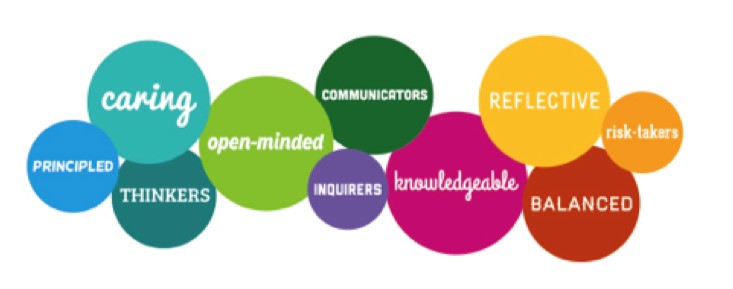
Principled -- For me, this is the most important Learner Profile in terms of Digital Citizenship. Users need to understand that anything they post to social media or the internet has now become 'public' record. Anyone can access your information and or use it. Any time I have posted anything to the internet I think to myself, "Would I be embarrassed if (Fill in the blank) saw it?" It's important to be responsible when using the internet...We don't always know who we may be communicating with or what their intentions are.
Caring -- It's easy to hide behind a computer screen and keyboard. I think that people tend to be braver and say things that they wouldn't necessarily say if they were communicating face to face. This is something I think about prior to posting comments on social media or in a blog post. Am I being polite? Would I have the courage to say this to the person face to face? Is what I am posting said in a tone that I would be able to accept if someone said it to me? Basically, If you can't be nice, then don't say it at all.
Thinkers -- There is so much garbage on the internet. When teaching my students about researching a topic, I remind them that they should check that what they have found is repeated in a similar way by at least two other sources. I remind them that not everything they read will be true. They have to think about what they are reading and ask themselves, am I reading this from a reliable source or is this equivalent to a tabloid news paper.
Open-minded -- Because the internet allows people to connect with one another from all over the world, I think that students and users are given the opportunity to see a topic from a different perspective. This allows students and users to expand their thinking and belief systems, by connecting with people who are different from themselves.
Communicators -- It is important to use language effectively and in a way that can be understood when using technology. What might be culturally appropriate in one culture may not be appropriate in another culture, so being aware of that when communicating collaboratively when online.
Inquirers -- Users have the ability to find out information, ask questions, make observation and communicate with others when online. Using technology encourages a user to broaden their curiosity. It results in instant gratification.
Knowledgeable -- Users are able to gain a wealth of knowledge from the online world using resources that are written in different perspectives. Again, the user needs to ensure the information they are obtaining is reliable.
Reflective -- The user needs to be reflective about many subjects when using the internet. They should take into consideration the information they are sharing and the language that is being used when sharing it digitally. They should reflect on the information they've obtained, "Is it reliable?" "Is what I'm communicating respectful and culturally acceptable?"
Balanced -- It is important that the user is not relying too much or spending too much time on the internet. Their physical, emotional and mental health need to be kept in mind when using digital resources or games. One must ask, "Am I becoming consumed by being online?" "Is this addictive?" "Am I making 'real' face to face connections with people as well?"
Risk-taker -- The user will often take on different roles when using digital tools. They may create their own blog, take on a leadership role by starting a new chat group, step out of their comfort zone by posting appropriate videos of themselves. Forming connections with complete strangers is the sign of a risk-taker.









